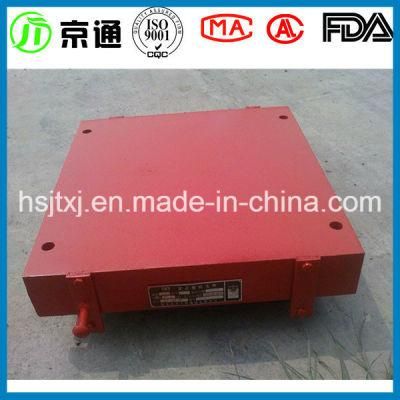
Professional Jingtong Factory Rubber Pot Brdige Bearing
Hengshui Jingtong Rubber Co., Ltd.- Rolling Body:Ball Bearings
- The Number of Rows:Multi-column
- Outer Dimension:Small and Medium-Sized (60-115mm)
- Material:Steel Structure
- Spherical:Aligning Bearings
- Load Direction:Thrust Bearing
Base Info
- Model NO.:pot brdige bearing 009
- Separated:Unseparated
- Main Material:Rubber+Steel Structure
- Size:Customized
- Finish:Spray, Galvanized
- Color:Grey, Yellow, Red
- Load:2000kn etc.
- Types:Gpz, Gqz, Jpz, Jqz
- Offer:Drawing
- Factory Location:Hegnshui, China
- Business Type:Factory Manufacturer
- Name and Mark:Jingtong Rubber
- Usage:Bridge Construction
- Certification:BV, CE, ISO, SGS
- Customized:Customized
- Transport Package:Plastic Bag, Then Pallet Delivery
- Specification:SGS, CE
- Trademark:HENGHSUI JINGTONG
- Origin:Hengshui City, China
- HS Code:7604299000
- Production Capacity:20 Set, 12 Hours, One Production Line.
Description
Basic Info.
Model NO. pot brdige bearing 009 Separated Unseparated Main Material Rubber+Steel Structure Size Customized Finish Spray, Galvanized Color Grey, Yellow, Red Load 2000kn etc. Types Gpz, Gqz, Jpz, Jqz Offer Drawing Factory Location Hegnshui, China Business Type Factory Manufacturer Name and Mark Jingtong Rubber Usage Bridge Construction Certification BV, CE, ISO, SGS Customized Customized Transport Package Plastic Bag, Then Pallet Delivery Specification SGS, CE Trademark HENGHSUI JINGTONG Origin Hengshui City, China HS Code 7604299000 Production Capacity 20 Set, 12 Hours, One Production Line.Product Description
Description of pot bridge bearing:Pot bridge bearing, with elastomeric bearing pad fitted inside of steel plate, is the widest used type for transferring vertical or horizontal loads from superstructure to the pier as well as allowing rotations on any axis. Meanwhile, it's capable to accommodate horizontal displacements of superstructure taking advantages of the reduced friction coefficient between stainless steel panels and a layer of PTFE.
Components of pot bridge bearing:
Features of pot bridge bearing:
With low-profile yet high loading capability over 50,000 KN.Maximized shearing strength of elastomer pad through the method of encasing it in the steel pot.Allow for large rotations ranging from 0 to 0.03 rad.Low friction coefficient between 1% and 3%.Excellent fatigue, impact and aging resistance of the layer of PTFE.All the metallic parts are protected against corrosion by galvanization and epoxy painting according to EN 1337-9 (other protective coatings are available as your requirements).Easy and quick to install.Easy to maintain and replace the worn out and broken part.Complying with BS EN-1337, KS4424, AASHO, ISO or other custom standards.Applications of pot bridge bearing:
Incrementally launched bridges.Curved or skewed bridges.Structures with rotations in various directions.Structures using the incremental launching methods.Highways and railways, etc.Types of pot bridge bearing :
According to horizontal movements, pot bridge bearings can be classified into three types as follows:
Free sliding pot bearing is able to slid and rotate in all directions without any restraints.Fixed pot bearing restrains movements in all directions. Under loads, the elastomeric bearing pad behaves likes an incompressible confined fluid which enables the rotations on any axis. Edge & center guided bearing features fitted edge or center guide to limit the bearing's movements. It allows for movements in longitudinal or transversal directions.
